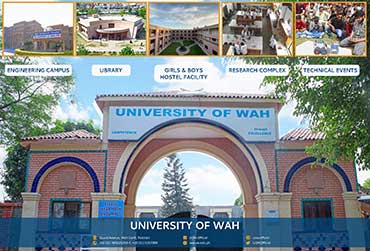| FIRST SEMESTER |
|
SECOND SEMESTER |
| Code |
Course Title |
CH |
|
Code |
Course Title |
CH |
| PHY-101 |
Applied Physics |
2 |
|
ME-112 |
Engineering Statics |
3 |
| CHM-103 |
Applied Chemistry |
2 |
|
ME-112L |
Engineering Statics Lab |
1 |
| PKS-101 |
Pakistan Studies |
2 |
|
ME- 122 |
Engineering Materials |
3 |
| ENG-103 |
Communication Skills |
2 |
|
ME-131 |
Thermodynamics - I |
3 |
| CS-101 |
Computer System and Programming |
2 |
|
ME-131L |
Thermodynamics - I Lab |
1 |
| CS-101L |
Computer System and Programming Lab |
1 |
|
ISL-101 |
Islamic Studies |
2 |
| MTH-103 |
Calculus and Analytical Geometry |
3 |
|
MTH-104 |
Linear Algebra and Ordinary Differential Equations |
3 |
| ME-111L |
Engineering Drawing and Graphics Lab |
2 |
|
ME-121L |
Workshop Practice Lab |
2 |
| MGT-101 |
Occupational Health, Safety and Environment Management |
1 |
|
|
TOTAL (Theory + Lab) |
18 (14+4) |
| |
TOTAL (Theory + Lab) |
17 (14+3) |
|
| THIRD SEMESTER |
|
FOURTH SEMESTER |
| Code |
Course Title |
CH |
|
Code |
Course Title |
CH |
| ME-211 |
Engineering Dynamics |
3 |
|
ME-213 |
Mechanics of Machines |
3 |
| ME-212 |
Mechanics of Materials - I |
3 |
|
ME-213L |
Mechanics of Machines Lab |
1 |
| ME-212L |
Mechanics of Materials - I Lab |
1 |
|
ME-214 |
Measurement and Instrumentation |
2 |
| ME-231 |
Thermodynamics - II |
3 |
|
ME-214L |
Measurement and Instrumentation Lab |
1 |
| ME-231L |
Thermodynamics - II Lab |
1 |
|
ME-232 |
Fluid Mechanics - I |
3 |
| EE-209 |
Electrical Engineering |
2 |
|
ME-232L |
Fluid Mechanics - I Lab |
1 |
| EE-209L |
Electrical Engineering Lab |
1 |
|
MTH-204 |
Numerical Analysis |
2 |
| MTH-203 |
Complex Variables and Transforms |
3 |
|
MTH-204L |
Numerical Analysis Lab |
1 |
| |
|
|
|
HU-201 |
Professional Ethics |
2 |
| |
TOTAL (Theory + Lab) |
17 (14+3) |
|
|
TOTAL (Theory + Lab) |
16 (12+4) |
| FIFTH SEMESTER |
|
SIXTH SEMESTER |
| Code |
Course Title |
CH |
|
Code |
Course Title |
CH |
| ME-311 |
Mechanics of Materials - II |
3 |
|
ME-313 |
Control Engineering |
3 |
| ME-311L |
Mechanics of Materials - II Lab |
1 |
|
ME-313L |
Control Engineering Lab |
1 |
| ME-314 |
Technical Report Writing |
2 |
|
ME-312 |
Machine Design |
3 |
| ME-331 |
Fluid Mechanics - II |
3 |
|
ME-322 |
Computer Aided Design and Manufacturing |
2 |
| ME-331L |
Fluid Mechanics - II Lab |
1 |
|
ME-322L |
Computer Aided Design and Manufacturing Lab |
1 |
| ME-321 |
Manufacturing Processes |
3 |
|
ME-332 |
Internal Combustion Engines |
3 |
| ME-321L |
Manufacturing Processes Lab |
1 |
|
ME-332L |
Internal Combustion Engines Lab |
1 |
| EE-309 |
Modern Electronics |
2 |
|
MTH-301 |
Engineering Statistics and Probability |
2 |
| EE-309L |
Modern Electronics Lab |
1 |
|
|
TOTAL (Theory + Lab) |
16 (13+3) |
| |
TOTAL (Theory + Lab) |
17 (13+4) |
|
|
|
|
| SEVENTH SEMESTER |
|
EIGHTH SEMESTER |
| Code |
Course Title |
CH |
|
Code |
Course Title |
CH |
| ME-411 |
Mechanical Vibration |
3 |
|
ME-432 |
Heating, Ventilation and Air Conditioning Systems |
2 |
| ME-411L |
Mechanical Vibration Lab |
1 |
|
ME-432L |
Heating, Ventilation and Air Conditioning Systems Lab |
1 |
| ME-4XY |
Technical Elective Course - I |
3 |
|
ME-4XY |
Technical Elective Course - II |
3 |
| ME-4XYL |
Technical Elective Course Lab - I |
1 |
|
MGT-4XY |
Management Science Elective Course - II |
3 |
| ME-431 |
Heat and Mass Transfer |
3 |
|
ECO-401 |
Engineering Economics and Optimization |
3 |
| ME-431L |
Heat and Mass Transfer Lab |
1 |
|
ME-499 |
Senior Design Project |
3 |
| ME-499 |
Senior Design Project |
3 |
|
|
TOTAL (Theory + Lab) |
15 (14+1) |
| MGT-4XY |
Management Science Elective Course - I |
3 |
|
|
|
|
| |
TOTAL (Theory + Lab) |
18 (15+3) |
|
|
|
|









